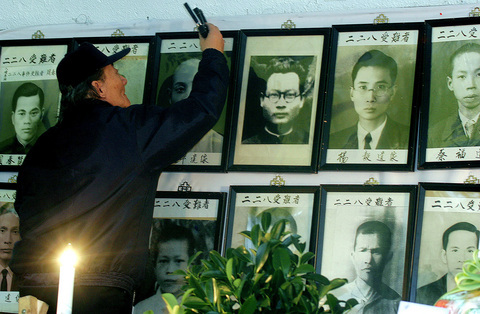Amid discussions over who should be held responsible for the Feb. 28 Incident in 1947 -- a debate generated by the upcoming 228 Peace Memorial Day -- a group of second-generation Mainlanders said that the politicization of issues will not bring about harmony between ethnic groups in Taiwan.
To commemorate the 58th anniversary of the massacre, the 228 Incident Memorial Foundation yesterday released a report which blamed the tragedy on former ROC president Chiang Kai-shek (蔣介石) and former Taiwan governor Chen Yi (陳儀).

PHOTO: SEAN CHAO, TAIPEI TIMES
"Although Taiwan is now a democracy and the 228 Incident is no longer taboo, discussions on related issues often fall into conflicts among political parties," said Chou Yong-hong (周永鴻), director of the Mainlander Association, a group founded by second-generation Mainlanders to promote harmony between ethnic groups.
To better understand the connection between the 228 Incident and ethnic relations, the Mainlander Association released yesterday the results of a telephone survey the group conducted last month, making 1,000 random phone calls in Taipei City and Taipei County residents.
According to the survey, about 40 percent of the participants said that discussing 228 Incident-related issues deepens the ethnic split between Mainlanders and native Taiwanese. However, 30 percent said that discussions help build a bridge between ethnic groups.
While split over whether talking about the 228 incident helps ethnic relations, the survey showed that more than 80 percent of the respondents agreed that tensions between ethnic groups are a result of political maneuvering. Further, over 50 percent think that ethnic tension is a serious problem in Taiwan.
In addition, more than 40 percent said that, as an ethnic group, Mainlanders are losing their political influence.
Chief executive director of the association, Huang Luo-fei (黃洛斐), said that characterizing the 228 Incident as a conflict between victims and perpetrators paints Mainlanders as those who are guilty of the massacre.
"In talking about the 228 Incident, it is crucial to focus on the individuals who were involved in the tragedy." Huang said.
"Accusing an ethnic group of a historical crime is not the solution to ethnic conflict," Huang added.
While approving the foundation's efforts to find the truth of the 228 Incident, Huang called on all ethnic groups to share their experiences.
"The history of the 228 Incident is shared by all the ethnic groups in Taiwan. Only by sharing our experiences and trying to reach a mutual understanding can we heal the still-festering wounds caused by the tragedy," Huang said.

A strong continental cold air mass is to bring pollutants to Taiwan from tomorrow, the Ministry of Environment said today, as it issued an “orange” air quality alert for most of the country. All of Taiwan except for Hualien and Taitung counties is to be under an “orange” air quality alert tomorrow, indicating air quality that is unhealthy for sensitive groups. In China, areas from Shandong to Shanghai have been enveloped in haze since Saturday, the ministry said in a news release. Yesterday, hourly concentrations of PM2.5 in these areas ranged from 65 to 160 micrograms per cubic meter (mg/m³), and pollutants were

Taiwan’s armed forces have established response protocols for a wide range of sudden contingencies, including the “Wan Chun Plan” to protect the head of state, the Ministry of Defense (MND) said today. After US President Donald Trump on Saturday launched a series of airstrikes in Venezuela and kidnapped Venezuelan President Nicolas Maduro, concerns have been raised as to whether China would launch a similar “decapitation strike” on Taiwan. The armed forces regularly coordinate with relevant agencies and practice drills to ensure preparedness for a wide range of scenarios, Vice Minister of National Defense Hsu Szu-chien (徐斯儉) told reporters before a

EVA Airways on Saturday said that it had suspended a pilot and opened an investigation after he allegedly lost his temper and punched the first officer several times as their plane was taxiing before takeoff at Los Angeles International Airport. According to a report published on Thursday by The Reporter, the incident occurred after the flight’s Malaysian first officer tried to warn the Taiwanese pilot, surnamed Wen (文), that he was taxiing faster than the speed limit of 30 knots (55.6kph). After alerting the pilot several times without response, the first officer manually applied the brakes in accordance with standard operating

The New Taipei City Social Welfare Department on Thursday celebrated Paralympic competitor Chen Tzu-wei (張孜維), who received last year’s national Golden Eagle award for exemplary achievement by Taiwanese with disabilities. Chen, who suffers from childhood-onset muscular dystrophy, did not attend the first award ceremony held by the Ministry of Health and Welfare in November due to illness. Chen was formally presented with the award at the department, where he gave thanks to government workers for supporting his education and livelihood, the department said in a statement. Chen was raised by the Ai-hsin Home for Persons with Disabilities in the city’s Bali District (八里)